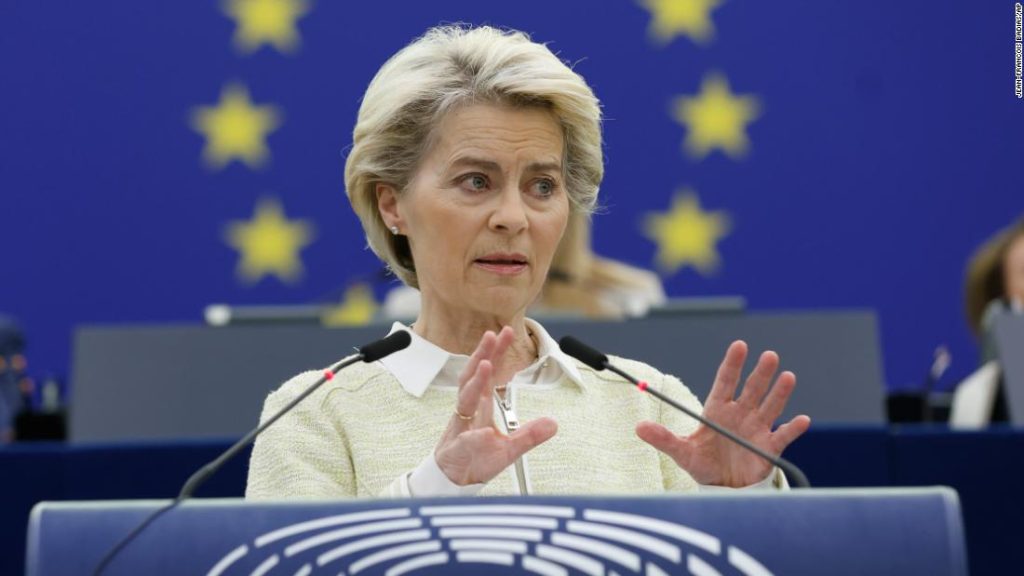
But the plan immediately ran into opposition from EU countries seeking a longer transition period, including Hungary, which had already reportedly offered an extra year to give up Russian oil.
“The shortest period, we’ve made it clear about that, our oil companies have been clear about that, is three to five years,” Prime Minister Viktor Orban’s spokesman, Zoltan Kovacs, told CNN’s Eleni Geokos.
European Commission President Ursula von der Leyen said earlier Wednesday that the measures would form part of the sixth round of sanctions against Russia over its invasion of Ukraine.
“We are now proposing an embargo on Russian oil,” she said in a speech to the European Parliament. “Let’s be clear: it will not be easy. But we simply have to work on it. We will make sure that we are gradually getting rid of Russian oil in an orderly way, to double the pressure on Russia, while minimizing the impact on our economies.”
It added that crude oil supplies will be phased out within six months, and imports of refined oil products by the end of 2022.
News of the proposal boosted crude oil prices by about 4%. Brent crude, the global benchmark, was trading at roughly $109 a barrel, while US oil futures crossed $106 a barrel at 12.30pm ET.
Oil prices are up about 40% since the start of the year amid fears that the Russian invasion of Ukraine could lead to a supply shock, driving up inflation and putting pressure on European economies.
Hungary said it could not support the proposal in its current form because it was concerned about what this might mean for the country’s energy security. According to the International Energy Agency, nearly 60% of its imported oil came from Russia in 2021.
“The core of decision-making in Europe is consensus,” Kovacs said. “We have said to Brussels and all European countries, that on behalf of Hungary, this cannot be done as required.”
Reuters reported that Slovakia – which got 92 percent of its oil imports from Russia last year – and the Czech Republic also sought longer transition periods than those envisaged in the European Union plan.
Russia is the world’s second largest exporter of crude oil, and last year accounted for about 27% of the European Union’s oil imports. The United States, Canada, the United Kingdom and Australia have already banned imports.
These sanctions – and de facto embargoes by some European oil refineries and traders – have hit Russian oil prices. Its benchmark Urals crude is now trading at a discount of $35 a barrel to Brent, compared to less than $1 before the invasion.
Some customers in Asia are said to be buying more Russian oil but not in enough quantities to make up for the loss of Western buyers.
“Russia’s ability to redirect all unwanted shipments from the West to Asia is limited, which means that in the event of an embargo, Russia will have to cut production even more because it lacks the storage capacity for additional crude oil volumes,” analysts at Rystad Energy wrote. Monday’s research report.
The International Energy Agency recently estimated that Russian oil supplies will decline by 1.5 million barrels per day in April as demand declines, with those losses accelerating to 3 million barrels per day this month.
But the rise in global oil and natural gas prices means that Moscow continues to reap huge sums from its energy exports. Rystad estimates that Russia will collect more than $180 billion in energy tax revenue this year – 45% more than in 2021 – despite oil production cuts.
financial isolation
The Association for Worldwide Interbank Financial Telecommunication, which is based in Belgium, must comply with European Union regulations. With no universally accepted alternative, this is an essential plumbing of global finance.
“We hit banks that are systemically important to the Russian financial system and Putin’s ability to wreak havoc,” von der Leyen said. This will reinforce the complete isolation of the Russian financial sector from the world system.”
Three major Russian state-owned radio stations will also be banned from European airwaves.
Anna Cuban and Julia Horowitz contributed to this article.




More Stories
Journalists convicted in Hong Kong sedition case
Stand News: Hong Kong journalists convicted of sedition in case critics say highlights erosion of press freedom
Shark decapitates teen off Jamaica coast